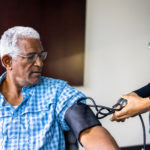What’s Causing Heart Attacks In Young Women?
A friend, age 44, recently had a heart attack. She’s in great shape, not overweight, doesn’t smoke. Her doctor said the problem was a tear in a blood vessel in her heart. Can you tell me anything about this?
Andrew Weil, M.D. | May 1, 2017

You’re describing Spontaneous Coronary Artery Dissection (SCAD), a heart attack that occurs as a result of a tear in the wall of a coronary artery. When this happens, blood can pass through the innermost layer of the 3-layer artery wall and become trapped, bulging inward. This narrows or blocks the artery, causing a heart attack.
SCAD appears to occur mostly in women, particularly those between the ages of 30 and 50, most of whom have no heart risk factors. It is the number-one cause of heart attacks in women under 50, pregnant women and new mothers.
We don’t know what causes SCAD, but in 30 percent of cases, affected women have recently given birth. In men, it tends to occur after extreme exertion.
SCAD is also linked to fibromuscular dysplasia (FMD), a condition that causes the irregular growth of cells in one or more artery walls. This can weaken the walls and reduce blood flow. SCAD also can cause high blood pressure, stroke and tears in other blood vessels.
Other risk factors appear to be uncontrolled high blood pressure and use of cocaine and other illegal drugs. In addition, diseases such as lupus that cause inflammation of blood vessels have been linked to SCAD, as have genetic diseases that affect connective tissues.
Symptoms of SCAD are like a heart attack initiated by other causes of arterial blockage and include chest pain, a rapid heartbeat, pain in the arms, shoulders or jaw, shortness of breath, sweating, extreme fatigue, nausea and dizziness. Anyone experiencing these symptoms should get immediate medical attention. Call 911. Without prompt treatment, SCAD can be fatal.
Diagnosis requires the same tests used to assess other types of heart attacks, although a definitive diagnosis requires one of two tests, intravascular ultrasound or optical coherence tomography screening, which enable doctors to see the artery from the inside out.
When possible, treatment relies on letting the damaged artery heal on its own. Later, doctors may recommend taking aspirin prophylactically, as well as nitrates and calcium channel blockers, drugs that can help control any chest pain. Blood pressure medication may be recommended to reduce the heart’s demand for blood and pressure in the torn artery. Blood thinning drugs may also be used to prevent a clot from forming in the damaged artery, along with cholesterol-lowering drugs, if needed.
Because some of the diseases linked to SCAD are genetic, patients may be referred to a genetic counselor to review their family history. They also may need testing for weaknesses in other blood vessels. SCAD can recur after successful treatment (sometimes in the near term, sometimes years in the future). Studies are ongoing to determine which patients are more likely to experience a recurrence.
Andrew Weil, M.D.











